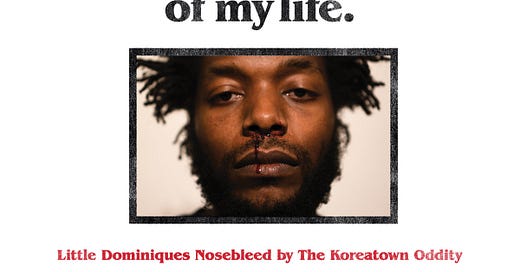List season is just around the bend, and major publications are going to start naming their album of the year candidates and rankings the best albums of the year. Some amazing projects are going to get left of these prestigious lists and it’ll be a tragedy. So for the next few weeks, I’m focusing on a few albums that need to be “Listed” on these end-of-the-year lists and why they deserve to be there.
The Koreatown Oddity’s childhood sounds a lot like mine. And yours. And, well, everyones. He uses his latest album, “Little Dominiques Nosebleed,” as an open mic reading of the most impactful moments of his upbringing, moments seared so deep into his brain it’s apparent they’re mostly responsible for molding him into the eclectic rapper he is today. With diverse song structure and beat selection, the 16-track album deserves a lot of shine on all year-end lists.
The Koreatown Oddity displays his past throughout the album with no shame, evident by proclaiming the two accidents he was involved in when he was a child in bold letters on the album cover. One accident broke his leg, and the other broke his nose. The latter led to chronic nosebleeds that affected him throughout his life, including a constant risk of suffocating in his sleep as a child, sometimes waking up to pools of blood in his bed. Later in life, it would be the sole reason he couldn’t snort cocaine. He discusses these two events on “Little Dominiques Nosebleed Part 1” and “Little Dominiques Nosebleed Part 2”, each dedicated to the accidents.
Like most of the 14 tracks (one interlude and one outro) on the album, the two-part tale is backed with beats carrying tonal shifts at the drop of a hat or ushered in by skits, Richard Pryor samples, DJ scratches, or a combination of all three. K-town self-produced the album, leaning on traditional boom-bap beats stuffed with quirks and a unique rhyming style that reminds me of MF Doom. Songs like the upbeat Weed in LA, Koreatown Oddity, and Ginkabiloba exemplify the core themes and sounds represented throughout the project.
When K-Town gets bored of talking about his traumatic injuries, he usually finds himself talking about Koreatown, his hometown and the place that shares his name. The Central LA neighborhood is passively mentioned in his autobiographical monologues about trauma and joy. But on “Kimchi,” he takes the time to appreciate his neighborhood despite its apparent negative traits and history. “Same place where they shot up Robert F. Kennedy, is the same place that brought up a young n*gga like me,” he says in the chorus. Koreatown might be fucked up and misunderstood, but who would K-Town be without it?
Storytelling his past and commenting on his surroundings isn’t just a weak attempt to give his fans a detailed peak at his life. His effort isn’t for show or a plea for pity. K-Town uses his ambitious diary readings to ultimately nudge us towards a sense of humility and self-love, lessons he learned through a tumultuous upbringing. “Lap of Luxury,” one of the album’s final tracks, is a smooth critique of American greed and materialism when read at face value. That’s until K-Town says, “I’m not talking ‘bout material shit/ I’m speaking more in a spiritual sense.”
The message isn’t hidden deep for Pitchfork writers to eloquently express with snooty six-syllable words. K-Town wants you to think of your broken leg or broken nose moments and how they strengthened you; to think of the small moments in your childhood and think of them fondly, like picking De’angelo as your main in Ninja Turtles or the kid around the way who put you on to Reading Rainbow; to think about the best and worst parts of your surroundings and extract all the positives you can.
The Koreatown Oddity accomplishes that—not in a neatly wrapped package like a Grammy-winning artist would do (“I wanna win a Grammy, not for the accolades
Just to act super n*ggerish when I hop on stage”), but as a battered and bruised human from the graffiti riddled buildings of Koreatown. The stories are funny, captivating and enlightening. When it’s combined with his signature sound as a longtime producer and rapper that bounced around the indie rap scene for years before this, “Little Dominique’s Nosebleed” is a clear top contender in 2020’s array of rap albums. It seems like the two serious car accidents that would change Dominiques life forever changed it for the better.
Welp, hope y’all enjoyed this edition of Packs. We back next Friday with a new delivery.
Between Packs, follow me on all the socials: @Tribecalledni on damn-near everything.
Until next time, be cool.




